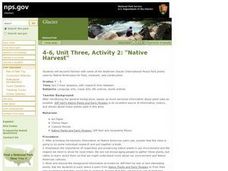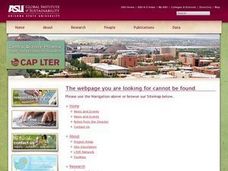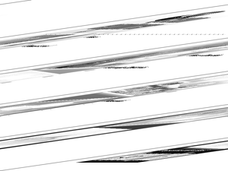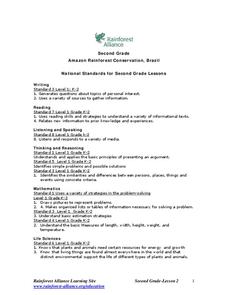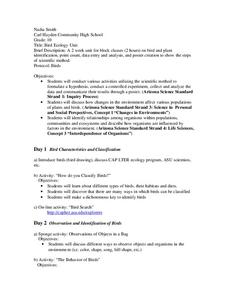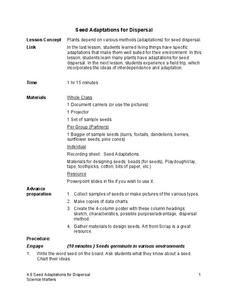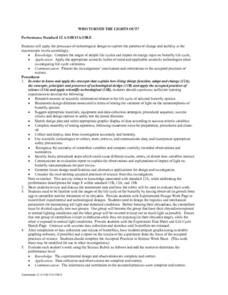Curated OER
Native Harvest
Students read Native Plants and Early Peoples and explore the plants in Waterton-Glacier International Peace Park and find how the Native Americans used them. In this Native American plant and people lesson, students research two types...
Curated OER
Exploration of 'pill bugs'
Fifth graders define words. They create a dichotomous key. After carefully examining pill bugs, 5th graders record observations. They compare and contrast habitats of pillbugs.
Curated OER
Landfills and Contamination
High schoolers discover the dangers of landfills to our environment by investigating leachate. In this environmental lesson, students create a model landfill experiment in which they observe the effect of rain on a landfill over the...
Curated OER
Terrestrial Sequestration - Photosynthesis and Cellular Respiration
Students investigate how plants absorb carbon dioxide during photosynthesis. In this biology lesson, students differentiate photosynthesis and cellular respiration. They discuss the important role of plants in the environment.
Curated OER
Cycling Water Through the Environment
Students identify the ways in which water moves through our environment and consider the different forms it can be found in. They view videos, conduct experiments and participate in class discussions. Students determine the role that...
Curated OER
Health Wheel Self-Care Plan For Diabetics
Students create a health wheel outlining an integrated daily living plan for people with diabetes. Using various resources and experiments, students a personalized system for maintaining a healthy lifestyle as a diabetic, including...
Curated OER
Recycled Paper Making
Second graders investigate the life of a recycled newspaper by experimenting in class. In this recycling lesson, 2nd graders create their own recycled paper pulp by mixing an old newspaper into a bucket and adding water. Students...
Curated OER
Reduced Fare
Students discover the relationship between tectonic plate boundaries and the communities of life that thrive at such boundaries. In this biology lesson, students find that methane from oxidized carbon in sediments provides nutrients for...
Curated OER
Acorns
Students experience hoarding food for winter. For this squirrel lesson, students simulate hoarding behavior as either a red or gray squirrel. Students play a game called Winter Survival and discover how squirrels survive through the...
Curated OER
Impact!!
Students perform a science experiment. In this algebra lesson, students collect data from their experiment and create a graph. They analyze the graph and draw conclusion.
Curated OER
Journal of the Stars
Students receive balloons representing the "Life Cycle of the Stars." As the attached script is read, students follow the directions for the color of balloon they are given. Students chart the results for their star. They plot data from...
Curated OER
Amazon Rainforest Conservation, Brazil
Students explore the concept of understanding the effects of disturbances in an environment. In this life science lesson, students use the game Jenga to help capture the idea of environment disturbances. Students discuss the effects of...
Curated OER
Apply Scientific Inquiry and Scientific Habits of Mind
Learners review the components of the scientific inquiry method. In groups, they develop hypothesis on a variety of different topics and design an investigation or experiment to test it. They share their conclusions with the class and...
Curated OER
Seed Structure and Seed Dispersal
Third graders plant seeds. In this seed structure lesson, 3rd graders identify parts of a seed and plant a lima bean seed. Students discuss and reflect on the process in their journals.
Curated OER
Water Quality and Dissolved Oxygen
Students investigate the relationship between dissolved oxygen and organic materials and aquatic organisms. This is a 3-lesson series in which students explore dissolved oxygen and then design an experiment testing the effects of changes.
Curated OER
Bird Ecology Unit
Tenth graders conduct various activities utilizing the scientific method to formulate a hypothesis, conduct a controlled experiment, collect and analyze the data and communicate their results through a poster. They also identify...
Curated OER
Does the Introduction of Pesticides and Fertilizers Alter an Aquatic Ecosystem?
Students conduct an experiment using a small sample from a local water source. They introduce fertilizers and pesticides, separately, and carefully examine the results in their simulated aquatic ecosystem.
Space Awareness
What is Time?
Does it ever seem like time is slipping through your fingers? Model the passing of time with an hourglass activity in which individuals determine whether hourglasses are the most efficient way to measure time.
Curated OER
Life Traps
Students participate in a lab activity in which they collect microbes on an agar plate. After discussing microbes and where they might be found, they trap microbes in the Petri dishes following specific guidelines. They observe any...
University of Georgia
Flavor of Organic Chemistry
Introduce organic chemistry through an analysis of flavor. A three-part unit begins with an overview of the components of flavor. Next, scholars prepare esters through esterification. Finally, they examine how all senses have an impact...
Science Matters
Seed Adaptations for Dispersal
After a grand conversation about seeds, adaptation, and dispersal, scholars work collaboratively to examine seeds and record their findings on a four-column chart. Small groups share their observations and further discuss seed...
Curated OER
Who Turned the Lights Out?
Students discover the life cycle of butterfly by observing its growth from egg to caterpillar and the formation of its chrysalis. Students conduct an experiment in which they design housing for the chrysalises which are either in full...
Curated OER
Birth, Growth, And Development
Students understand that all living things have a life cycle that includes being born, developing into an adult, reproducing, and eventually dying.
Curated OER
Plankton / Phytoplankton
Learners discuss the importance of plankton in the ocean ecosystem. For this biology lesson, students identify the different types plankton by observing them under the microscope. They explain how plankton population affect global climate.


